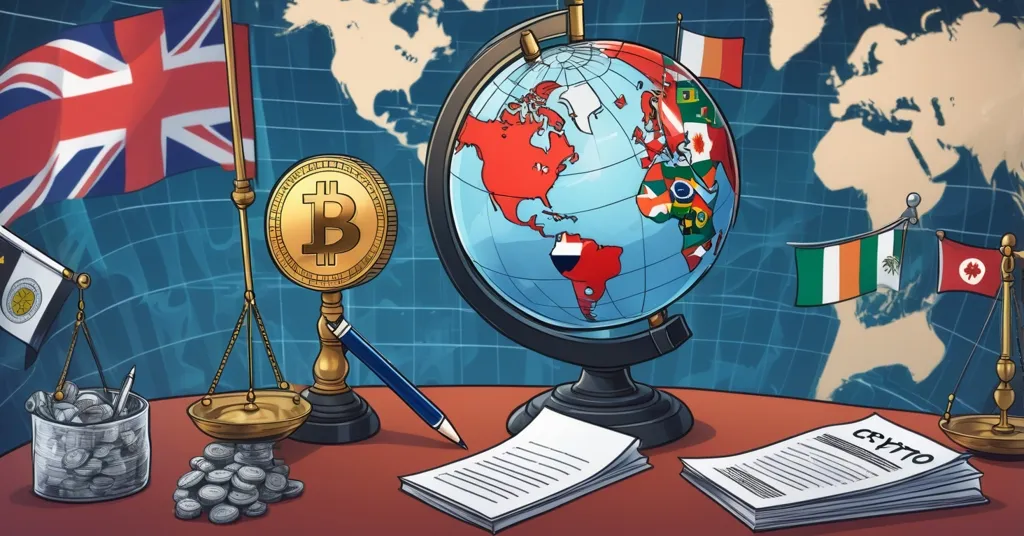Binance Shifts to Crypto Policy Advisor, Eyes Global HQ Amid Regulatory Challenges

Binance Goes Diplomatic: Advising Governments On Crypto Laws
Can a former crypto rebel become a global policy influencer? Binance, once notorious for dodging regulations, is now stepping into the big leagues as a policy advisor to governments worldwide on cryptocurrency laws. This surprising pivot comes as CEO Richard Teng reports that the exchange is fielding proposals from various governments and large investment funds owned by governments—known as sovereign wealth funds—eager to establish their own crypto reserves. Additionally, Binance is contemplating its first official global headquarters, marking a significant shift in its operations.
- Binance transitions to policy advisor on crypto laws.
- Governments and sovereign wealth funds approach Binance for crypto reserves.
- Binance considers establishing first official global headquarters.
Richard Teng, the CEO of Binance, has highlighted the company’s shift from regulatory evasion to a more cooperative stance. “We have received in fact a significant number of proposals by several governments and sovereign wealth funds to set up their own crypto reserves,” Teng noted, emphasizing the growing interest from global entities in embracing cryptocurrencies. Binance, once the crypto world’s rebellious teen, is now playing by the rules, with approximately 25% of its 6,000 staff dedicated to following the rules set by financial authorities.
This change in direction aligns with the evolving U.S. crypto policies under former President Donald Trump. Trump’s executive order to establish a Strategic Bitcoin Reserve—a national stockpile of Bitcoin—in 2025 has positioned the U.S. as a leader in the digital asset space. “Compared to many other jurisdictions, [the US] is way ahead on that front,” Teng acknowledged, suggesting that this leadership has spurred other nations to seek Binance’s expertise in shaping their own crypto policies.
Regulatory Challenges
Despite this new role, Binance continues to face legal hurdles. In countries like Spain and France, the exchange is embroiled in ongoing legal challenges over issues related to anti-money laundering and securities regulations. Additionally, Binance is under a five-year surveillance program by the U.S. Financial Crimes Enforcement Network (FinCEN), highlighting the complexities of navigating international regulatory landscapes.
In an effort to ease tensions and potentially re-enter the American market, Binance is in negotiations with the U.S. Treasury. Interestingly, the U.S. Securities and Exchange Commission (SEC) has reportedly suspended its investigation into Binance amid these discussions. This could signal a thawing of relations, although recent updates suggest no official suspension has been announced. According to regulatory expert John Doe, “Binance’s shift towards compliance could pave the way for a more stable relationship with U.S. regulators, but the road ahead is still uncertain.”
Strategic Moves
Adding to the intrigue, Binance is contemplating establishing its first official global headquarters, signaling a move away from its stateless operations. “It demands serious consideration,” Teng remarked on the topic, indicating the strategic importance of this decision. Potential locations for the headquarters include countries with favorable crypto regulations, such as Singapore or Switzerland.
Further intertwining with political circles, Binance is linked to World Liberty Financial, a Trump-supporting crypto project set to release a stablecoin on Binance’s blockchain. This connection could influence Binance’s regulatory strategies and its role in the broader political landscape. World Liberty Financial aims to use the stablecoin to promote financial freedom and libertarian values, which aligns with Binance’s ethos of decentralization and disruption.
Expanding Influence
Binance’s founder, Changpeng Zhao, now advises on blockchain policy in Pakistan, showcasing the company’s expanding influence into emerging markets. This advisory role could have significant geopolitical implications as more countries look to harness blockchain technology for economic development and financial inclusion.
Potential Risks and Criticisms
While Binance’s new direction is promising, it is not without risks and criticisms. Some experts argue that Binance’s past regulatory issues could undermine its credibility as a policy advisor. Others worry that its close ties to political projects like World Liberty Financial could lead to conflicts of interest. As Binance navigates these challenges, its journey from regulatory outlier to policy influencer offers a fascinating case study in the evolving world of cryptocurrency.
Key Questions and Takeaways:
What is Binance’s new role in global crypto regulation?
Binance is transitioning into a policy consultant for governments worldwide, advising on crypto laws and helping to establish crypto reserves.
How has Binance’s approach to regulation changed?
Binance has shifted from evading regulations to emphasizing compliance, with 25% of its staff dedicated to following the rules set by financial authorities.
What impact has U.S. policy under Donald Trump had on global crypto regulation?
Trump’s directive to establish a national Bitcoin reserve has spurred global interest in crypto policy, with many nations now turning to Binance for guidance.
What challenges does Binance still face despite its new direction?
Binance faces legal challenges in Spain and France related to anti-money laundering and securities regulations, and is under a five-year surveillance program by FinCEN in the U.S.
Why is Binance considering establishing a global headquarters?
Establishing a global headquarters would end Binance’s stateless period, allowing it to better navigate regulatory landscapes and potentially re-enter the U.S. market.
What geopolitical implications could arise from Binance’s advisory roles?
Binance’s advisory roles in emerging markets like Pakistan could influence how these countries adopt and regulate blockchain technology, potentially shifting the global economic landscape.
What potential risks and criticisms does Binance face in its new role?
Binance’s past regulatory issues could undermine its credibility as a policy advisor, and its political ties, such as with World Liberty Financial, could lead to conflicts of interest.
Binance’s journey from regulatory outlier to policy influencer offers a compelling case study in the evolving world of cryptocurrency. Whether this new path will lead to greater stability or more challenges remains to be seen, but one thing is clear: Binance is playing a pivotal role in shaping the future of crypto regulation worldwide.



